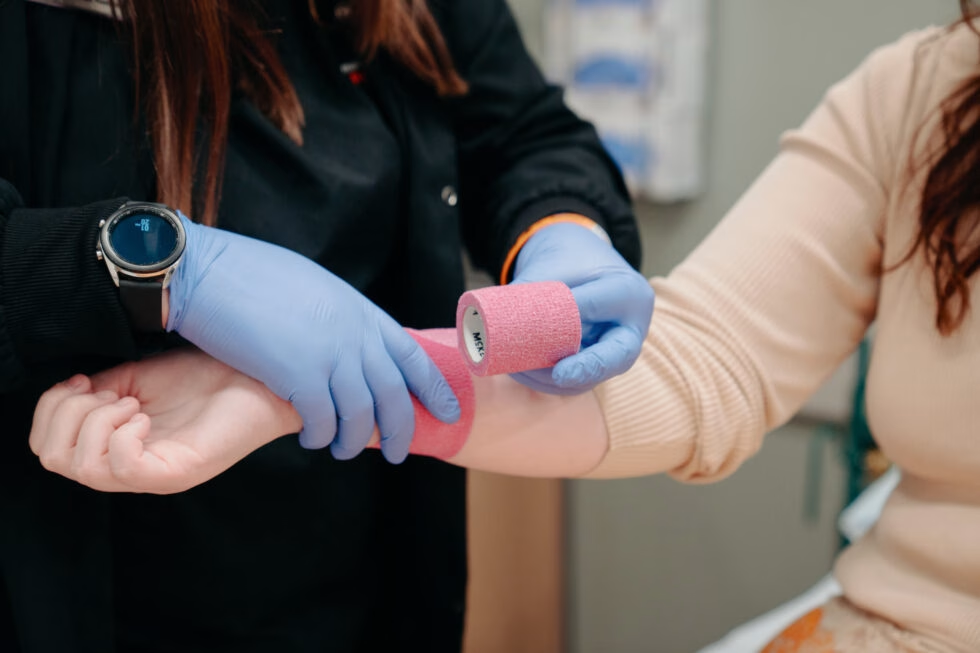
Learn how contagious HFMD is and how to avoid spreading it. Visit urgent care clinic near you, open 7 days a week. Walk-ins welcome for fast, expert care.
In Dalton, GA, parks like Hamilton Park and the Dalton Greenway offer great play areas for kids. Remember to practice good hygiene to prevent the spread of hand, foot, and mouth disease (HFMD), especially after enjoying these public spaces.
If you or your child has been diagnosed with hand, foot, and mouth disease (HFMD), one of your primary concerns is likely whether the illness is contagious and how easily it can spread. Since HFMD is highly contagious, especially among children, understanding how it spreads and how to prevent transmission is crucial for keeping yourself and others healthy.
How Does HFMD Spread?
HFMD is caused by viruses in the enterovirus family, most commonly the coxsackievirus A16 and enterovirus 71. It spreads through direct contact with an infected person’s bodily fluids, such as saliva, mucus, blister fluid, or feces. The virus can also survive on surfaces, which makes it possible to contract HFMD by touching contaminated objects like toys, door handles, or countertops.
Because of its contagious nature, HFMD tends to spread quickly in environments where children are in close contact with one another, such as daycare centers, schools, or playgrounds. Adults can also contract HFMD, though the symptoms are typically milder.
What Are the Key Transmission Points to Watch For?
There are several ways in which HFMD can spread from one person to another:
- Person-to-Person Contact: HFMD is most commonly spread through direct contact with an infected person’s respiratory droplets. This means that coughing, sneezing, kissing, or sharing utensils with someone who has the virus can easily spread it.
- Surfaces and Objects: The virus can survive on surfaces for several hours, so touching an object or surface that has been contaminated (like a toy, door handle, or shared item) can lead to infection if you then touch your mouth, nose, or eyes.
- Diaper Changing and Bathroom Use: HFMD can also spread through stool, so it’s important to wash your hands thoroughly after changing diapers or using the bathroom, especially if you are caring for a child who is infected.
How Long Is HFMD Considered Contagious?
One of the reasons HFMD spreads so easily is that people can be contagious before they even show symptoms. Infected individuals are most contagious during the first week of illness, particularly when they have a fever. However, even after the visible symptoms, such as the rash and mouth sores, have cleared, the virus can still be present in the body for weeks. In fact, the virus can be shed in an infected person’s stool for up to several weeks after recovery, which is why good hygiene practices remain important long after symptoms disappear.
Can Adults Spread HFMD?
Yes, adults can contract and spread HFMD, although their symptoms are often less severe than in children. Parents or caregivers of young children who have HFMD are particularly at risk of catching the virus, especially if they have frequent close contact with the infected child. It’s important for adults to practice the same preventative measures, like handwashing and avoiding close contact with sick individuals, to prevent the virus from spreading.
How Can I Prevent the Spread of HFMD?
Preventing the spread of HFMD involves a combination of good hygiene practices and limiting contact with infected individuals. Here are some steps you can take to reduce the risk of transmission:
- Wash Hands Frequently: Handwashing with soap and water is the best way to prevent the spread of HFMD. Encourage your child to wash their hands frequently, especially after using the bathroom, before eating, and after touching any shared surfaces or objects.
- Disinfect Surfaces and Objects: Regularly clean and disinfect surfaces that are frequently touched, such as toys, countertops, doorknobs, and other shared items. This is particularly important in households where one family member is infected.
- Avoid Close Contact: If you or your child has HFMD, it’s important to avoid close contact with others to prevent spreading the virus. This means avoiding kissing, hugging, or sharing utensils until you’re no longer contagious.
- Teach Coughing and Sneezing Etiquette: Encourage children to cover their mouth and nose with a tissue or their elbow when coughing or sneezing to help prevent the spread of germs.
When Can My Child Return to School or Daycare After Having HMFD?
Children with HFMD should stay home from school or daycare until their fever has subsided and their blisters have healed. While the exact timeline can vary, most children can return to their normal activities once their symptoms have improved and they no longer have a fever. Be sure to check with your child’s school or daycare for specific guidelines on when it’s safe for them to return.
HFMD is a highly contagious illness, but with proper hygiene and preventive measures, you can reduce the risk of spreading the virus to others. If you or your child’s case of HMFD worsens or doesn’t seem to be improving, visit AFC Dalton for effective care and treatment that you can trust.


